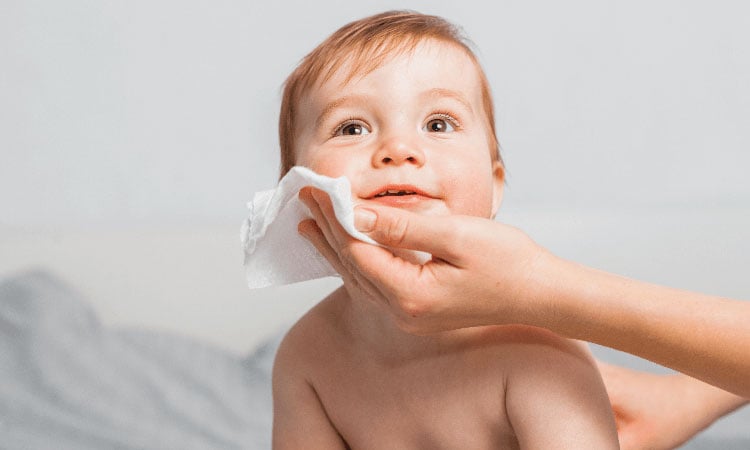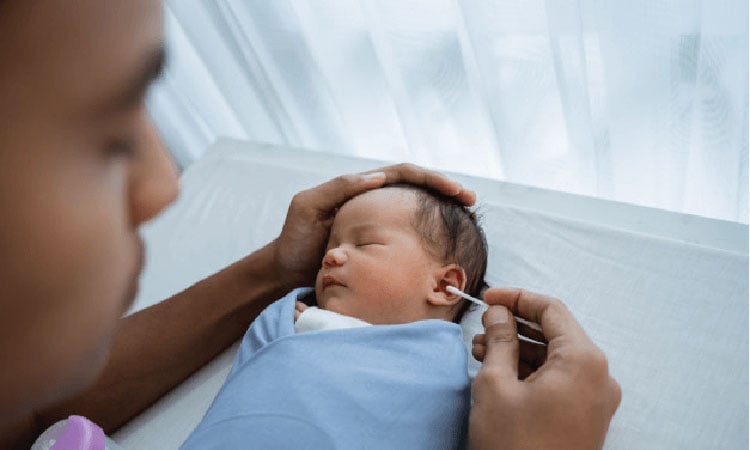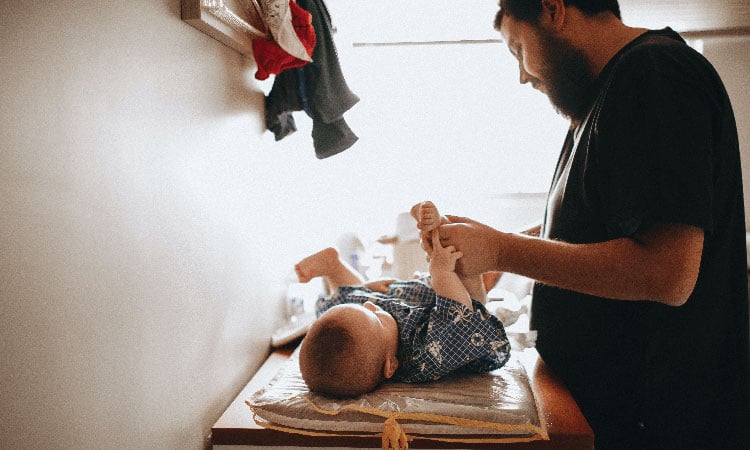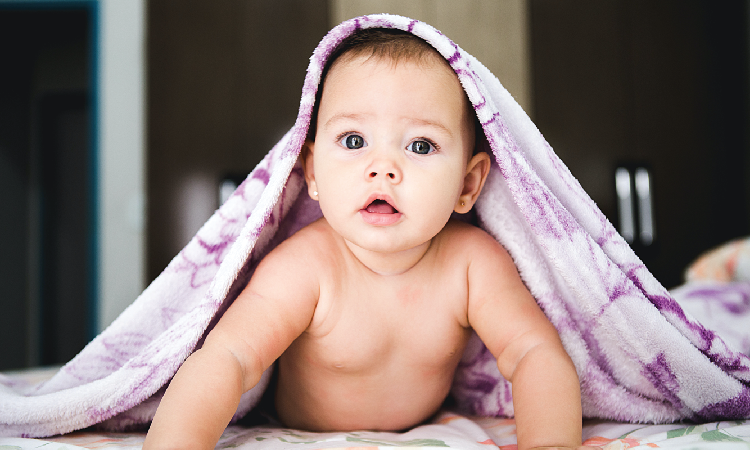Taking care of a baby does not only entail you providing him/her with shelter, food, toys, clothes etc. as these are basic requirements that every new parent has to fulfill. However, a more essential task that the parents have at hand when the baby arrives is paying close attention to baby hygiene needs on a daily basis. Under no circumstances should you undermine the hygiene requirements of your baby as it has a lasting impact on the health and happiness of your baby’s life.
Why Is Baby Hygiene Important?
Remember, your baby’s body and immune system is fragile and susceptible to all kinds of passing diseases. Any germ or virus which might not be harmful to an adult body can cause tremendous reactions and infections within and on a baby’s body. Their skin is sensitive and extremely permeable as well. The baby’s capacity to deal with the new environment outside the protective womb does not develop quickly and thus incorporation of strict baby hygiene routine is the responsibility of the parent.
Apart from keeping your baby hygiene needs in mind; you need to pay attention to your personal hygiene requirements because you will be the first point of contact for the baby. Keeping the house clean, along with keeping the baby’s room. Regularly clean baby toys and disinfect all things that baby touches or plays with. A clean and dust free environment at all times is another measure that you must take to ensure the health of the baby.
Right from taking care of your baby’s skin and hair to cleaning baby ears, eyes, hands and legs- the hygiene process is all encompassing. It is always advised to know all about baby hygiene- from head to toe- in order to be better equipped to protect your baby and to invest in some of the best baby hygiene products accordingly.
13 Baby Hygiene Tips – From Head To Toe
Here are 13 baby hygiene tips that we are putting forward to help you develop a good defence mechanism for your baby without restricting your baby’s freedom and happiness to enjoy life to the fullest. The time you spend cleaning your baby is also the time your baby would be playful, so these moments stay with you a lifetime.
First things first, before the parents or caretakers touch the baby, they should ensure their hands are clean. Wash your hands everytime you touch the baby with water and anti-bacterial soap or handwash.
1. Use warm water to clean the face

Adorable baby face! Yes, no matter how adorable your little munchkin looks, you need to ensure that the baby’s face is clean all the time. Use lukewarm water and a soft washcloth. Anything that is stuck on the face will become soft and can be easily wiped away.
Check This Out: Cotton P04 Washcloth
Pay attention to the neck area. Dirt, spit up, sweat, drool etc. can over time gather on the surface of your baby’s face which has to be wiped off with the help of warm water and a sponge/cloth. Pat the face with the cloth but scrubbing the face is to be avoided at all cost.
Your baby’s skin is very sensitive so be as gentle as you can.
The question as to when to use soap on the face will depend on the recommendation of your pediatrician; sensitivity of your baby’s skin and any skin irritation like acne your baby might be suffering from.
2. Rightly washing baby hair
Firstly, remember that baby hair does not need to be washed daily. While washing baby hair you have to be particular about the shampoo you are using on the baby. Use a gentle, chemical and parabens free baby shampoo from a good brand.
Gently massaging the head and scalp is very vital to avoid causing any hair loss issue. Towel dry baby hair gently without being rough on either the hair or the head.
Check this out– Sebamed Children’s Shampoo
For combing your baby’s hair use a soft bristle brush delicately. Use of rubber bands and hair bands is not really recommended or advisable as they tend to damage the hair. If you are blessed with a baby who has a full head, trim them as and when they get long by distracting the baby a bit.
3. Gum and teeth care
True, babies do not have teeth, but oral hygiene and dental care is not to be ignored. Make sure to wipe your baby’s gums gently with a soft washcloth after every feed or meal. You can simply wrap it around your index finger and run it along your baby’s gums. Make it a habit that you stick to until the baby flashes her first set of white beauties.
Once the teeth appear, brushing the teeth gently and softly with the help of baby toothbrush and good quality fluoride free toothpaste from the baby hygiene kit is a must. Start early with the two time brushing regime, mornings and bedtime to inculcate the habit.
4. Pay attention to the baby’s eyes and ears

The two most susceptible as well as important areas of the baby’s body are the eyes and ears which have to be kept clean at all times. For the eyes, you can utilize cotton balls dipped in warm water to clear the mucus build up as and when required. Use one cotton ball for each time and very, very delicately clean the mucus from the inside corner to the outward.
You may need to clean your baby’s eyes a few times everyday, because the more mucus builds up, the harder it gets to clean it.
For cleaning baby ears, also cotton balls dipped in water can be used but just clean the outer areas and the area behind the ears. Avoid inserting anything inside the baby’s ears as it might cause damage to the ear drums, sometimes permanently.
Check this out: Chicco Baby Moments Cotton Buds 90 pcs
If you are worried about the baby’s ear wax, be assured that it will be carried out. NEVER use cotton swabs to clean earwax as it can cause the wax to accumulate in the ear canal. Sometimes, it gets blocked and that warrants an emergency. Check with your doctor if you feel there is too much of wax or your baby has something in her ears.
5. Keep the baby’s nose mucus-free
Nose cleaning becomes essential component of baby hygiene so that your baby can breathe without any hassle. Dried mucus can be removed with the help of wash cloth that is a bit damp.
If your baby has a stuffy nose, nasal care will be a bit different and you may need to use nasal saline to moisten the mucus for easy removal. For a runny and irritated nose, parents can simply use nasal aspirator/syringe to clear the nose and facilitate breathing.
It can get a bit tricky cleaning your baby’s nose especially if it is stuffy. Reach out to your doctor and seek advise.
6. Significance of nail care
The baby hygiene routine would be incomplete if you do not take proper care of your baby’s nails. But as important as it is to trim your baby’s nails, it is equally unnerving clipping them. Personally, I feel the best time to trim your baby’s nails is when they are sleeping.
Nail clippers or scissors specifically designed for baby hands are available in the market; you can get hold of them to trim the nails of your baby so that they can be kept clean of dirt. Trimming the nails is also important as babies have a tendency to scratch themselves and getting hurt.
At times, you may cut a bit deep- happens with everyone, and in case this happens, do not panic. Just run the baby’s finger in some cold water and apply a tissue wrap and press it a little to stop the bleeding.
Do not cry, the baby won’t even notice.
7. Taking extra care of umbilical cord
The umbilical cord inside the womb served a purpose to keep your baby healthy, however after the baby is born it is an area that is prone to infections and irritation. So taking care of umbilical cord area is the topmost hygiene requirement for the baby until it falls off.
Dip cotton swab in rubbing alcohol to keep the area clean; make sure the diaper does not touch the area; keep the area dry at all times. Always fold the diaper a little below the umbilical cord. The idea is to have it dried up and fall off on its own, so expose it to air whenever you can. Like if you are in a warm place, leave the baby with a t-shirt and diaper exposing the umbilical cord to air for some time.
And yes, a little discharge and redness around the area is quite normal so do not panic.
8. Essentials for skin care routine
Baby hygiene and health definitely are closely associated with skin care so make sure you keep moisturizing your baby’s skin on a daily basis – after every bath or when you change the baby.
Choose baby products that are hypoallergenic. Always moisturise your baby’s skin when it is slightly damp so that the moisture can be retained. Use products specifically designed for babies and avoid using harsh soap or shampoo while bathing your baby.
Many of us follow the ritual or massaging a baby after or before a bath, which tends to make the skin soft and supple. Just ensure you choose the right oil.
Make sure you clean the folds of the skin because that is where most of the grim and sweat hides. Invest in skin care products which are suitable for your baby especially products made up of organic and natural ingredients. You can let go of the baby powder, it is not really useful.
9. Hygiene around genital areas
Tips for keeping the genital areas clean for baby boys and baby girls are given separately below:
Genital area cleaning for boys–
The penis can be cleaned while giving a bath to your baby boy. remember that the foreskin of uncircumcised penis must not be tampered with; whereas circumcised area must be washed gently.
For avoiding the penis to stick to the diapers, use a bit of petroleum jelly at the end. And yes, diapers have to be changed at regular intervals to avoid any infections whatsoever.
Genital area cleaning for girls–
You can either use cotton swab or soft cloth to clean the folds and labia of your baby girl’s genitals while giving her a bath. Remember to clean in gentle motions from front to back. You may find it is the easiest to clean when your baby spreads her legs apart.
Clean the area everytime you change her diaper, and when she grows everytime she pees.
For all babies, diaper free time is very essential so that there is no moisture build up in the genital area.
10. Cleaning tips for diaper area

Changing diapers at regular intervals of time is of utmost importance so that your baby does not suffer from diaper rashes and redness. When you are changing the diaper make sure all the supplies are within reach.
Baby wipes are one baby hygiene products that you can conveniently use to clean the urine and stool from the diaper area without using water.
Wipe the genitals delicately, lifting legs up to wipe poop if any on the bum area. Apply a little lotion and leave the area to air-dry. Always let the area dry off completely only then make your baby wear another clean diaper.
11. Inculcate habit of changing clothes of your baby
It would be best if you can change your baby’s clothes at least twice a day. It is always recommended to keep daywear and nightwear separate. Infact, you should ideally change baby’s whenever you find them getting dirty. Whether it is saliva, drool, food, spitups, milk, it can be a cause of breeding germs besides smelling bad. Make sure your baby is dressed in fresh, clean clothes everytime.
Washing the baby clothes cleanly with a good non-chemical detergent is also a very essential part of baby hygiene routine. You can get specific baby laundry detergents from reputed brands. Some people also rinse their baby’s clothes with antiseptics like Dettol.
Never club your baby’s laundry with the rest of the clothes. Use gentle wash cycles. If you are using cloth diapers, wash them separately.
12. Baby feet care
Those tiny little feet, those lovely little toes! We know, we know! Baby feet are adorable, aren’t they? feet care is also not a huge task and requires little of your time. Yes, the toenails must be trimmed regularly; look out for ingrown nails as they hurt a lot.
Wash the baby’s feet at least once a day and check out for any cuts or bruises. Make sure to wash between the toes as that is where dust accumulates. Before you put on socks, make sure the feet are dry and moisturised properly.
Keep an eye out for blisters which can develop if the baby wears tight shoes or is in socks for long times. Once your baby starts to walk, let your baby walk around the house barefoot for proper feet development.
13. Regularly giving bath to your baby
For overall cleaning of the baby’s body and maintenance of proper baby hygiene- regular baby bath is absolutely necessary. By regular it does not mean everyday but at least 2 or 3 times in a week.
If you are confused as to what do I wash my baby with then the answer is simple- with warm water, washcloth or sponge. Remember, mild cleansers or soap can be used after a few weeks and on the recommendation of your doctor.
How Do You Maintain Baby Hygiene?
Maintaining baby hygiene is not a humongous task if you as a parent put your heart and soul into it. Apart from keeping your baby clean from head to toe with our tips, you must make sure that the environment around your baby is also kept neat and tidy at all times. Ventilation system of your home must be proper and you must keep your baby’s room free of germs by using natural disinfectants.
Keeping your baby healthy and hygienic does not mean that other members of the family or people visiting your home have to be kept away from your baby. It just means you need to take your precautions to protect your baby from anything that can harm him/her. You do not have to do everything alone; you can ask your family members to help you out with other tasks around the house so that you can take care of your baby’s hygiene needs.
The more you pay attention to the baby hygiene, the more the good hygienic habits will be learnt and followed by your baby later in his/her life. So you must pave the way for a hale and hearty future of your baby by incorporating the best practices of hygiene right from the birth of your baby.
FAQs
Ideally, 2-3 times a week is enough for a baby, but if your baby really enjoys bathing and you stay in a hot place where there is a lot of sweating, bathing everyday is fine too. Just make sure you use warm water (check with your elbow) and a clean and soft washcloth untill the doctor gives a go-ahead for using a soap.
The tips above will help you clean your baby from head to toe, and ensure your baby is clean and happy. Remember that babies tend to get dirty quickly, so a routine from the start is essential to ensure cleanliness.
A baby hygiene kit is typically a collection of all products that are used to in cleaning and grooming a baby. Not only is a baby hygiene kit cost effective than to buy individual products, but it also saves a lot of guesswork. When you buy a baby hygiene kit from a good brand, you can be assured of finding every little thing you will need for your precious little one.

